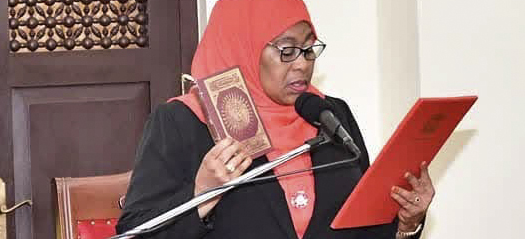
Samia Suluhu Hassan takes oath as Tanzania’s president, making the history as the first female leader of the East African country, in Dodoma on March 19. (Credit: Tanzanian Presidency/Handout/Anadolu Agency)
Ahmed Rajab
Tanzania’s new President, Samia Suluhu Hassan, is a good example of an unknown known. Although she had been in public life, both in her native Zanzibar and on Mainland Tanzania since 2000, she remains an enigma. Mama Samia, as she is now fondly called, became the country’s first female President on March 19 upon the death two days earlier of President John Pombe Magufuli, who ruled Tanzania with an iron fist. Samia was his Vice-President since they were elected in 2015 on a joint ticket of the ruling Chama cha Mapinduzi (CCM).
Since her predecessor’s demise, she had been eclipsed by the bellicose larger-than-life Magufuli, who took delight in publicly humiliating senior Government officials, including his ministers. Magufuli was infamous for his misogynistic tantrums and remarks, which must have made life awkward, to say the least for his principal assistant. Indeed, there were rumours of a rift between the two and of Samia’s threat to resign. Only the intervention of party bigwigs prevented a very public fallout.
The duo was re-elected last October in elections that were roundly condemned by the opposition, rights activists and the diplomatic community as being marred by accusations of fraud and gross irregularities. It was assumed that she would end her political life in 2025 which would have marked Magufuli’s second and final term. Death intervened to change Samia’s trajectory and to propel her to her country’s highest office.
The participation of women in African politics is nothing new and indeed Africa has had female presidents before: Sylvia Kinigi of Burundi who acted as President from October 1993 to February 1994; Ellen Johnson Sirleaf in Liberia (2006-2018) and Joyce Banda of Malawi (2012-2014). Ethiopia has had a female President Sahle-Wok Zewde since October 2018; Central African Republic’s Catherine Samba acted as President (January 2014 to March 2016) and Mauritius has had a Muslim President Dr Ameenah Firdaus Gurib-Fakim who resigned in 2018 as a result of a financial scandal. Her role, like that of Ethiopia’s Sahle-Wok, was mainly ceremonial.
What further distinguishes Samia is that, unlike Mauritius’s Ameenah, she is Africa’s first female President of the Muslim faith who is always seen in public modestly dressed and wearing a hijab. She is Tanzania’s third Muslim President after Ali Hassan Mwinyi (1985-1995) and Jakaya Kikwete (2005-2015).
Samia was born 61 years ago in Kizimkazi, a historic fishing village on the southern coast of Unguja, Zanzibar’s main island. Kizimkazi was once a walled city but is now famous as a tourist attraction with its pristine beaches and pods of bottlenose dolphins. Her father was a school teacher and her mother was a housewife. She succeeded in life by dint of hard work.
Upon completion of her secondary education in 1977 she was employed as a clerk in the Isles’s Ministry of Planning and Development. A year later she was married to Hafidh Ameir, an agricultural officer, with whom she has four children.
Married life in the constrictive Zanzibari social environment did not deter her from pursuing further education. Her thirst for knowledge led her to enrol for several short courses on a part-time basis. In 1986, she graduated with an advanced diploma in public administration from the Institute of Development Management (present-day Mzumbe University) in mainland Tanzania. She was then employed on a development project which was funded by the UN World Food Programme.
Later, she attended the University of Manchester in the UK where she obtained a postgraduate diploma in Economics in 1994. In 1995 she graduated with an MSc in Community Economic Development through a joint programme between the Open University of Tanzania and the Southern New Hampshire University in the US.
Making her mark in the development work she emerged in the 1990s as the Executive Director of an umbrella body governing non-governmental organizations (NGOs) in Zanzibar. Her big and seminal break came in 2000 when she was elected as a CCM member to a special seat on the Isles’s legislature, the House of Representatives. She was immediately appointed as a minister by the then Zanzibar President Amani Abeid Karume. She was re-elected in 2005 and was again given a ministerial portfolio.
In 2010 she vied for a seat in the Tanzanian Union Parliament in Dodoma. She was elected by more than 80 per cent of the vote. President Kikwete gave Samia her first ministerial post in the Tanzanian Government when he appointed her as the Minister of State for Union Affairs dealing with the tough docket of the vexed relationship between Zanzibar and the Union Government. In 2014 she was appointed Vice Chairperson of the Constituent Assembly which was tasked with drafting the country’s new constitution. The exercise was eventually scuppered by the Government but there are now renewed calls for it to be revisited.
When the CCM picked Magufuli to run as its candidate in the 2015 Presidential election Samia emerged as his running mate having been proposed by Kikwete. Samia is everything that Magufuli was not. Unlike Magufuli who eschewed foreign travel, Samia is better known among fellow African leaders having interacted with them during
Africa Union and regional summits which she attended on behalf of her boss. Since being sworn in as President she has been dropping hints on her style of governance, principally that she will be consulting with her colleagues. She let us know that at least she did just that when she was considering the mini cabinet reshuffle which was necessitated by her sudden elevation to the highest office in the country. That was a marked departure from Magufuli’s one-man show.
Ahmed Rajab,
Zanzibari-born international journalist. Strategic Director, Universal TV channel & Affiliate, Kaduna-based Gusau Institute.